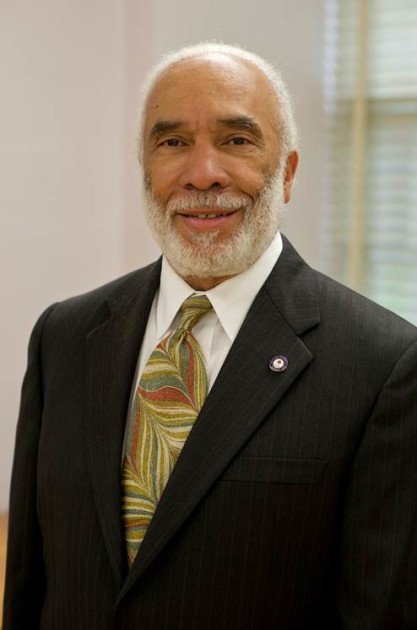 Frederick Jefferson, professor emeritus at the Warner School of Education, has had a long and distinguished record of leadership at Rochester, pioneering and championing programs that have made the University and the Rochester community more diverse and inclusive.
Frederick Jefferson, professor emeritus at the Warner School of Education, has had a long and distinguished record of leadership at Rochester, pioneering and championing programs that have made the University and the Rochester community more diverse and inclusive.
The University will recognize Jefferson’s many contributions during the University’s annual diversity conference on April 8, presenting him with the Frederick Douglass Medal.
Created in 2008, the Frederick Douglass Medal honors individuals of outstanding achievement as scholars or as civic leaders who represent the ideals for which Douglass stood and who have contributed to the educational life at the University or in the community, state, or nation. It is a joint initiative of the Office of the President and the Frederick Douglass Institute. Prior recipients include the late David Kearns, CEO of Xerox and deputy secretary of the United States Department of Education, and Walter Cooper, research scientist and educator.
Jefferson came to Rochester in 1973 as director of the University’s Educational Opportunity Program. Since then, he has served in a variety of roles—as director of the Department of Special Student Services, which oversaw minority student affairs, international student affairs, and disability services; as associate dean of students and assistant to the provost; as assistant to the president for University and community affairs, and as University intercessor, where he specializes in issues related to racial and ethnic diversity.
Since 1985, Jefferson has been a faculty member at the Warner School, where he was director of the Institute of Urban Schools and Education. He is currently professor emeritus in the Department of Counseling and Human Development.
“I have known Frederick Jefferson for most of his 43 years at the University of Rochester,” says Paul Burgett, vice president, senior advisor to the president, and dean. “His dedication to diversity and inclusion, his constancy, intelligence, and effectiveness in working within the University community and without to help create environments that are safe and welcoming to all people, regardless of race, ethnicity, gender, ability, and social class is legendary. Dr. Jefferson is more than merely the man himself … he is an important idea. His name alone elicits values and aspirations about diversity and inclusion to which all citizens should aspire. He is a community treasure.”
Jefferson has accepted calls to leadership throughout his professional life—in education, social service agencies, and community organizations. He chaired the board of Action for a Better Community for seven years and helped return that organization to solid financial health; he chaired the Martin Luther King Jr. Greater Rochester Festival Commission, the largest celebration of King’s legacy in the Rochester community; he has been an advisor to the Gateways Music Festival that brings classical musicians of African descent from around the country to Rochester biennially for a week-long series of concerts; he chaired the board of the American Red Cross and was the first African-American board chairman of the United Way of Rochester; and he currently chairs the board of the Baobab Cultural Center.
Jefferson is the recipient of many awards for his service to the community, including the James McCuller Award for Excellence sponsored by Action for a Better Community, Inc. (1995), and the Hannah G. Solomon Humanitarian Award made by the Rochester chapter of the National Council of Jewish Women (1989).

